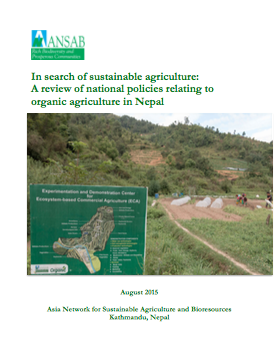Report And Case Studies
In search of sustainable agriculture: A review of national policies relating to organic agriculture in Nepal
 Author: Dr. Kishor Atreya
Author: Dr. Kishor Atreya
Publisher: ANSAB
Language: English
Date of Publication: August 2015
Number of Pages: 42+6
Price: Free
Nepal has a comparative advantage in developing sustainable agriculture; and the existence of some good practices that are scattered across the nation can be an asset to this direction. But efforts are still lacking to consolidate these good practices into a viable system of value chain. There is no any appropriate agribusiness model to apply under such situation. The sector is still mainly dominated by subsistence farming, traditional farming practices, land fragmentation, and low level of knowledge and suffers with low productivity and production. The sector is struggling to catch up with rapid changes in terms of new technologies, viable products, emerging markets and business possibilities. There is a widespread negative perception among the local people towards farming as menial, tedious and an un-prestigious employment partially due to small remuneration and the use of traditional farming practices. These factors have led the rural people, especially youths, to migrate to urban areas and abroad in search of better livelihood opportunities and higher incomes, thus leaving their children and elderly family behind.
In order to tap the potential that exist in Nepal’s agriculture sector and address the challenges of resource degradation, fragmented land holdings, erratic climate systems, poor market linkages and labor shortages currently being faced by this sector, ANSAB envisioned a program named Ecosystem-based Commercial Agriculture (ECA) with the aim to transform the traditional forestry and agriculture into climate smart, attractive and socially prestigious business. ECA, as envisioned by ANSAB, increases the production and productivity in a sustainable way, improves the resilience of agro-ecosystems and people to climate change, reduces/removes green house gases, and attract youths and make it socially prestigious generating better remuneration.
In this background, ANSAB has carried out this study to review the available national level policy documents and available literatures related to agriculture in order to analyze the current situation and policy gaps in the field of sustainable (organic) agriculture in Nepal.
